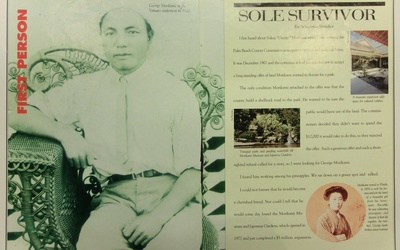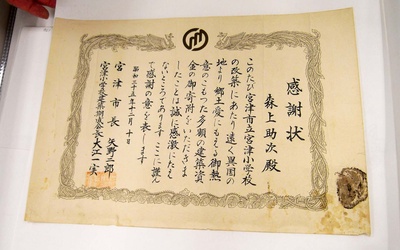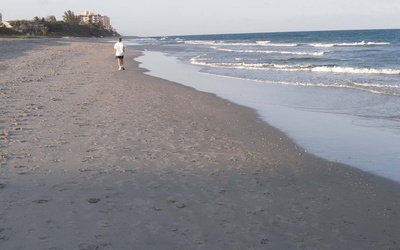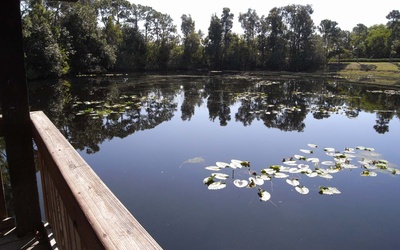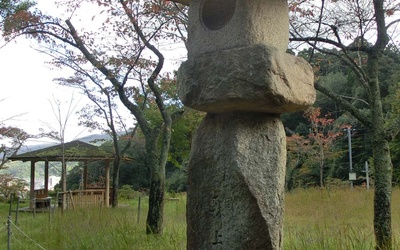A lonely longing for home - From the letters of Morikami Suketsugu, a Japanese immigrant in Florida
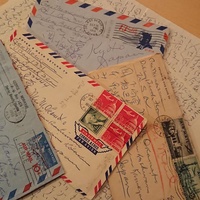
In the early 20th century, the Japanese village of Yamato Colony appeared in southern Florida. Morikami Sukeji (George Morikami), who immigrated from Miyazu, Kyoto City as a farmer and pioneer, is the man who laid the foundation for the Morikami Museum and Japanese Gardens, which is now located in Florida. He stayed on after the colony was dissolved and disappeared before the war, and continued farming alone through the war. He ended up donating a huge amount of land, leaving his name in the local area. He remained single throughout his life and never returned to Japan, but he was more homesick than most and continued to write letters to Japan. He corresponded frequently with the Okamoto family, including the wife and daughters of his late brother. Although he never met them, he treated them like family and sent them information about the situation and his thoughts in the area. The letters he left behind trace his life and lonely homesickness as a record of one generation.
Stories from this series
#18 When I returned to Kyoto...
Oct. 11, 2019 • Ryusuke Kawai
Morikami Sukeji, who traveled to the United States as a member of the Yamato Colony in South Florida and remained there alone until the end of his life after the colony was disbanded, continues to write letters to his sister-in-law and her family, who lost her husband (Sukeji's younger brother) after the war. In 1961, he talks about his five-year plan to create something resembling a garden on their property, but also speaks of his determination to travel to Central …
#17 What to remember at night when you can sleep
Sept. 27, 2019 • Ryusuke Kawai
Morikami Sukeji, who came to America as a member of the Yamato Colony in South Florida and stayed there alone until the end of his life after the colony was disbanded, continues to write letters to his sister-in-law and her family, who lost her husband (Sukeji's younger brother) after the war. In the latter half of 1960, he looks at the letters and photos from his niece and still remembers his hometown and his past. He suddenly reflects on the …
Episode 16: I want my will to be carried on...
Sept. 13, 2019 • Ryusuke Kawai
Morikami Sukeji came to America as a member of the Yamato Colony in South Florida, and remained there alone until the end of his life after the colony was disbanded. After the war, he continued to write letters to his sister-in-law and her family, who had lost her husband (Sukeji's younger brother). When a friend invites Sukeji to develop land in Honduras in Central America, he is moved. Is there anyone who can take up Sukeji's will as a single …
No. 15 I want to live to be 100 years old
Aug. 23, 2019 • Ryusuke Kawai
Morikami Sukeji, who traveled to America as a member of the Yamato Colony in South Florida and stayed there alone until the end of his life after the colony was disbanded, continued to write letters to his sister-in-law and her family, whose husband (Sukeji's younger brother) had died after the war. In 1960, after living in America, he was finally able to receive an end-of-life pension. He still had a strong desire to read, and said he wanted to live …
No. 14 Go to South America or become a naturalized citizen?
Aug. 9, 2019 • Ryusuke Kawai
Morikami Sukeji, who traveled to America as a member of the Yamato Colony in South Florida and remained there alone until the end of his life after the colony was disbanded, continues to write letters to his sister-in-law and her family, whose husband (Sukeji's younger brother) had died after the war. Sukeji wavers for many years about whether to return to Japan or stay, but then he says he will go to South America, or considers naturalizing... His intellectual curiosity …
Vol. 13 Uncle George Speaks
July 26, 2019 • Ryusuke Kawai
Morikami Sukeji, who came to America as a member of the Yamato Colony in South Florida and remained there alone until the end of his life after the colony was disbanded, continued to write letters to his sister-in-law and her family, who had lost her husband (Sukeji's younger brother) after the war. He worried about his nephews and nieces as if they were his own children, and as an uncle-long-legs, he helped with their school fees and gave them advice, …

